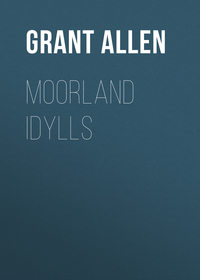 полная версия
полная версияPhilistia
'And yet,' Uta answered firmly, 'I still prefer Mr. Oswald. And if you care for my opinion, I should say that the aristocrat does all the dreaming, but the bourgeois does all the fighting; and that's the most important thing practically, after all.'
An hour later, Ernest was talking his future plans over with his brother Ronald. Would it be best for Ronald that he should take a mastership, and both should live together, or that he should go for the present to the Exmoors', and leave the question of Ronald's home arrangements still unsettled?
'It's so good of you to think of me in the matter, Ernest,' Ronald said, pressing his hand gently; 'but I don't think I ought to go away from mother before I'm twenty-one. To tell you the truth, Ernest, I hardly flatter myself she'd be really sorry to get rid of me; I'm afraid I'm a dreadful thorn in her side at present; she doesn't understand my ways, and perhaps I don't sympathise enough with hers; but still, if I were to propose to go, I feel sure she'd be very much annoyed, and treat it as a serious act of insubordination on my part. While I'm a minor, at least, I ought to remain with her; the Apostle tells us to obey our parents, in the Lord; and as long as she requires nothing from me that doesn't involve a dereliction of principle I think I must bear with it, though I acknowledge it's a cross, a heavy cross. Thank you so much for thinking of it, dearest Ernest.' And his eyes filled once more with tears as he spoke.
So it was finally arranged that for the present at least Ernest should accept Lady Exmoor's offer, and that as soon as Ronald was twenty-one he should look about for a suitable mastership, in order for the two brothers to go immediately into rooms together. Lady Le Breton was surprised at the decision; but as it was in her favour, she wisely abstained from gratifying her natural desire to make some more uncomplimentary references to the snuffy old German socialist. Sufficient unto the day was the triumph thereof; and she had no doubt in her own mind that if once Ernest could be induced to live for a while in really good society the well-known charms and graces of that society must finally tame his rugged breast, and wean him away from his unaccountable devotion to those horrid continental communists.
CHAPTER VIII
IN THE CAMP OF THE PHILISTINES
Dunbude Castle, Lord Exmoor's family seat, stands on the last spurs of the great North Devon uplands, overlooking the steep glen of a little boulder-encumbered stream, and commanding a distant view of the Severn Sea and the dim outlines of the blue Welsh hills beyond it. Behind the house, a castle only by courtesy (on the same principle as that by which every bishop lives in a palace), rises the jagged summit of the Cleave, a great weather-worn granite hill, sculptured on top by wind and rain into those fantastic lichen-covered pillars and tora and logans in which antiquarian fancy used so long to find the visible monuments of Druidical worship. All around, a wide brown waste of heather undulates and tosses wildly to the sky; and on the summit of the rolling moor where it rises and swells in one of its many rounded bosses, the antlered heads and shoulders of the red deer may often be seen etched in bold relief against the clear sky-line to the west, on sunny autumn evenings. But the castle itself and the surrounding grounds are not planned to harmonise with the rough moorland English scenery into whose midst they were unceremoniously pitchforked by the second earl. That distinguished man of taste, a light of the artistic world in his own day, had brought back from his Grand Tour his own ideal of a strictly classical domestic building, formed by impartially compounding a Palladian palace, a Doric temple, and a square redbrick English manor-house. After pulling down the original fourteenth-century castle, he had induced an eminent architect of the time to conspire with him in giving solid and permanent reality to this his awful imagining; and when he had completed it all, from portico to attic, he had extorted even the critical praise of Horace Walpole, who described it in one of his letters as a 'singular triumph of classical taste and architectural ingenuity.' It still remains unrivalled in its kind, the ugliest great country-seat in the county of Devon—some respectable authorities even say in the whole of England.
In front of the house an Italian garden, with balustrades of very doubtful marble, leads down by successive terraces and broad flights of steps to an artificial octagonal pool, formed by carefully destroying the whole natural beauty of the wild and rocky little English glen beneath. To feed it by fitting a conduit, the moss-grown boulders that strew the bed of the torrent above and below have been carefully removed, and the unwilling stream, as it runs into the pool, has been coerced into a long straight channel, bordered on either side by bedded turf, and planed off at measured intervals so as to produce a series of eminently regular and classical cascades. Even Lord Exmoor himself, who was a hunting man, without any pretence to that stupid rubbish about taste, did not care for the hopeless exterior of Dunbude Castle: he frankly admitted that the place was altogether too doosid artificial for the line of country. If they'd only left it alone, he said, in its own native condition, it would have been really pretty; but as they'd doctored it and spoilt it, why, there was nothing on earth to be done but just put up with it and whistle over it. What with the hounds, and the mortgages, and the settlements, and the red deer, and Goodwood, the estate couldn't possibly afford any money for making alterations down in the gardens.
The dog-cart was in waiting at the station to carry Ernest up to the castle; and as he reached the front door, Lady Hilda Tregellis strolled up the broad flight of steps from the garden to meet him. Lady Hilda was tall and decidedly handsome, as Ernest had rightly told Edie, but not pretty, and she was also just twenty. There was a free, careless, bold look in her face, that showed her at once a girl of spirit; indeed, if she had not been born a Tregellis, it was quite clear that she would have been predestined to turn out a strong-minded woman. There was nothing particularly delicate in Lady Hilda's features; they were well-modelled, but neither regular nor cold, nor with that peculiar stamp of artificial breeding which is so often found in the faces of English ladies. On the contrary, she looked like a perfectly self-confident handsome actress, too self-confident to be self-conscious, and accustomed to admiration wherever she turned. As Ernest jumped down from the dog-cart she advanced quickly to shake hands with him, and look him over critically from head to foot like a schoolboy taking stock of a new fellow.
'I'm so glad you've come, Mr. Le Breton,' she said, with an open smile upon her frank face. 'I was dreadfully afraid you wouldn't care for our proposition. Dunbude's the dullest hole in England, and we want somebody here to brighten it up, sadly. Did you ever see such an ugly monstrosity before, anywhere?'
'The country about's lovely,' Ernest answered, 'but the house itself is certainly rather ugly.'
'Ugly! It's hideous. And it's as dull as it's big,' said Hilda vehemently. 'You can't think what a time we have of it here half the year! I'm always longing for the season to come. Papa fills the house here with hunting men and shooting men—people without two ideas in their heads, you know, just like himself; and even THEY go out all day, and leave us women from morning till night to the society of their wives and daughters, who are exactly like them. Mr. Walsh—that's Lynmouth's last tutor—he was a perfect stick, a Cambridge man; Cambridge men always ARE sticks, I believe; you're Oxford, of course, aren't you? I thought so. Still, even Mr. Walsh was a little society, for I assure you, if it hadn't been for him, I should never have seen anybody, to talk to, from year's end to year's end. So when Mr. Walsh was going to leave us, I said to mamma, "Why not ask one of the Mr. Le Bretons?" I wanted to have somebody sensible here, and so I got her to let me write to your brother Ronald about the tutorship. Did he send you the letter? I hope you didn't think it was mine. Mamma dictated it, for I don't write such formal letters as that on my own account, I can tell you. I hate conventionality of any sort. At Dunbude we're all conventional, except me; but I won't be. Come up into the billiard-room, here, and sit down awhile; William will see about your portmanteau and things. Papa's out, of course, and so's Lynmouth; and mamma's somewhere or other, I don't know where; and so there's nobody in particular at home for you to report yourself to. You may as well come in here while I ring for them to get you some lunch ready. Nobody ever gets anything ready beforehand in this house. We lunched ourselves an hour ago.'
Ernest smiled at her volubility, and followed her quickly into the big bare billiard-room. He walked over to the fire and began to warm himself, while Hilda took down a cue and made stray shots in extraordinary angles at impossible cannons, all the time, as she went on talking to him. 'Was it very cold on the way down?' she asked.
'Yes, fairly. I'm not sorry to see the fire again. Why, you're quite an accomplished player.'
'There's nothing else to do at Dunbude, that's why. I practise about half my lifetime. So I wrote to your brother Ronald, as I was telling you, from mamma's dictation; and when I heard you were really coming, I was quite delighted about it. Do you remember, I met you twice last year, once at the Dolburys', and once somewhere else; and I thought you'd be a very good sort of person for Dunbude, you know, and about as much use to Lynmouth as anybody could be, which isn't saying much, of course, for he's a dreadful pickle. I insisted on putting in my letter that he was a dreadful pickle (that's a good stroke off the red; just enough side on), though mamma didn't want me to; because I thought you ought to know about it beforehand. But you remember him at Marlborough, of course; he was only a little fellow then, but still a pickle. He always was and he always will be. He's out shooting, now, with papa; and you'll never get him to settle down to anything, as long as there's a snipe or a plover banging about on the moor anywhere. He's quite incorrigible. Do you play at all? Won't you take a cue till your lunch's ready?'
'No, I don't play,' Ernest answered, half hesitating, 'or at least very little.'
'Oh, then you'll learn here, because you'll find nothing else to do. Do you shoot?'
'Oh no, never. I don't think it right.'
'Ah, yes, I remember. How delightful! Lady Le Breton told me all about it. You've got notions, haven't you? You're a Nihilist or a Fenian or something of that sort, and you don't shoot anything but czars and grand dukes, do you? I believe you want to cut all our heads off and have a red republic. Well, I'm sure that's very refreshing; for down here we're all as dull as sticks together; Tories, every one of us to a man; perfect unanimity; no differences of opinion; all as conventional and proper as the vicar's sermons. Now, to have somebody who wants to cut your head off, in the house, is really delightful. I love originality. Not that I've ever seen anybody original in all my life, for I haven't, but I'm sure it would be delightful if I did. One reads about original people in novels, you know, Dickens and that sort of thing; and I often think I should like to meet some of them (good stroke again; legs, legs, legs, if you please—no, it hasn't legs enough); but here, or for the matter of that, in town either, we never see anybody but the same eternal round of Algies, and Monties, and Berties, and Hughs—all very nice young men, no doubt; exceedingly proper, nothing against them; good shots, capital partners, excellent families, everything on earth that anybody could desire, except a single atom of personal originality. I assure you, if they were all shaken up in a bag together and well mixed, in evening clothes (so as not to tell them apart by the tweeds, you know), their own mothers wouldn't be able to separate them afterwards. But if you don't shoot and don't play billiards, I'm sure I don't know what you'll ever find to do with yourself here at Dunbude.'
'Don't you think,' Ernest said quietly, taking down a cue, 'one ought to have something better to do with one's time than shooting and playing billiards? In a world where so many labouring people are toiling and slaving in poverty and misery on our behalf, don't you think we should be trying to do something or other in return for universal humanity, to whom we owe so much for our board and lodging and clothing and amusement?'
'Well, now, that's just what I mean,' said Hilda ecstatically, with a neat shot off the cushion against the red and into the middle pocket; 'that's such a delightfully original way of looking at things, you see. We all of us here talk always about the partridges, and the red deer, and the turnips, and the Church, and dear Lady This, and that odious Lady That, and the growing insolence of the farmers, and the shocking insubordination of the lower classes, and the difficulty of getting really good servants, and the dreadful way those horrid Irish are shooting their kind-hearted indulgent landlords; or else we talk—the women especially—about how awfully bored we are. Lawn-tennis, you know, and dinners, and what a bad match Ethel Thingumbob has made. But you talk another kind of slang; I dare say it doesn't mean much; you know you're not working at anything very much more serious than we are; still it's a novelty. When we go to a coursing meeting, we're all on the hounds; but you're on the hare, and that's so delightfully original. I haven't the least doubt that if we were to talk about the Irish, you'd say you thought they ought to shoot their landlords. I remember you shocked mamma by saying something like it at the Dolburys'. Now, of course, it doesn't matter to me a bit which is right; you say the poor tenants are starving, and papa says the poor landlords can't get in their rents, and actually have to give up their hounds, poor fellows; and I don't know which of you is the most to be believed; only, what papa says is just the same thing that everybody says, and what you say has a certain charming freshness and variety about it. It's so funny to be told that one ought really to take the tenants into consideration. Exactly like your brother Ronald's notions about servants!'
'Your lunch is ready in the dining-room, sir,' said a voice at the door.
'Come back here when you've finished, Mr. Le Breton,' Hilda called after him. 'I'll teach you how to make that cannon you missed just now. If you mean to exist at Dunbude at all, it's absolutely necessary for you to learn billiards.'
Ernest turned in to lunch with an uncomfortable misgiving on his mind already that Dunbude was not exactly the right place for such a man as he to live in.
During the afternoon he saw nothing more of the family, save Lady Hilda; and it was not till the party assembled in the drawing-room before dinner that he met Lord and Lady Exmoor and his future pupil. Lynmouth had grown into a tall, handsome, manly-looking boy since Ernest last saw him; but he certainly looked exactly what Hilda had called him—a pickle. A few minutes' introductory conversation sufficed to show Ernest that whatever mind he possessed was wholly given over to horses, dogs, and partridges, and that the post of tutor at Dunbude Castle was not likely to prove a bed of roses.
'Seen the paper, Connemara?' Lord Exmoor asked of one of his guests, as they sat down to dinner. 'I haven't had a moment myself to snatch a look at the "Times" yet this evening; I'm really too busy almost even to read the daily papers. Anything fresh from Ireland?'
'Haven't seen it either,' Lord Connemara answered, glancing towards Lady Hilda. 'Perhaps somebody else has looked at the papers'?'
Nobody answered, so Ernest ventured to remark that the Irish news was rather worse again. Two bailiffs had been murdered near Castlebar.
'That's bad,' Lord Exmoor said, turning towards Ernest. 'I'm afraid there's a deal of distress in the West.'
'A great deal,' Ernest answered; 'positive starvation, I believe, in some parts of County Galway.'
'Well, not quite so bad as that,' Lord Exmoor replied, a little startled. 'I don't think any of the landlords are actually starving yet, though I've no doubt many of them are put to very great straits indeed by their inability to get in their rents.'
Ernest couldn't forbear gently smiling to himself at the misapprehension. 'Oh, I didn't mean the landlords,' he said quickly: 'I meant among the poor people.' As he spoke he was aware that Lady Hilda's eyes were fixed keenly upon him, and that she was immensely delighted at the temerity and originality displayed in the notion of his publicly taking Irish tenants into consideration at her father's table.
'Ah, the poor people,' Lord Exmoor answered with a slight sigh of relief, as who should say that THEIR condition didn't much matter to a philosophic mind. 'Yes, to be sure; I've no doubt some of them are very badly off, poor souls. But then they're such an idle improvident lot. Why don't they emigrate now, I should like to know?'
Ernest reflected silently that the inmates of Dunbude Castle did not exactly set them a model of patient industry; and that Lady Hilda's numerous allusions during the afternoon to the fact that the Dunbude estates were 'mortgaged up to the eyelids' (a condition of affairs to which she always alluded as though it were rather a subject of pride and congratulation than otherwise) did not speak very highly for their provident economy either. But even Ernest Le Breton had a solitary grain of worldly wisdom laid up somewhere in a corner of his brain, and he didn't think it advisable to give them the benefit of his own views upon the subject.
'There's a great deal of rubbish talked in England about Irish affairs, you know, Exmoor,' said Lord Connemara confidently. 'People never understand Ireland, I'm sure, until they've actually lived there. Would you believe it now, the correspondent of one of the London papers was quite indignant the other day because my agent had to evict a man for three years' rent at Ballynamara, and the man unfortunately went and died a week later on the public roadside. We produced medical evidence to show that he had suffered for years from heart disease, and would have died in any case, wherever he had been; but the editor fellow wanted to make political capital out of it, and kicked up quite a fuss about my agent's shocking inhumanity. As if we could possibly help ourselves in the matter! People must get their rents in somehow, mustn't they?'
'People must get their rents in somehow, of course,' Lord Exmoor assented, sympathetically; 'and I know all you men who are unlucky enough to own property in Ireland have a lot of trouble about it nowadays. Upon my word, what with Fenians, and what with Nihilists, and what with Communards, I really don't know what the world is coming to.'
'Most unchristian conduct, I call it,' said Lady Exmoor, who went in for being mildly and decorously religious. 'I really can't understand how people can believe such wicked doctrines as these communistic notions that are coming over people in these latter days.'
'No better than downright robbery,' Lord Connemara answered. 'Shaking the very foundations of society, I think it. All done so recklessly, too, without any care or any consideration.'
Ernest thought of old Max Schurz, with his lifelong economical studies, and wondered when Lord Connemara had found time to turn his own attention from foxes and fishing to economical problems; but, by a perfect miracle, he said nothing.
'You wouldn't believe the straits we're put to, Lady Exmoor,' the Irish Earl went on, 'through this horrid no-rent business. Absolute poverty, I assure you—absolute downright poverty. I've had to sell the Maid of Garunda this week, you know, and three others of the best horses in my stable, just to raise money for immediate necessities. Wanted to buy a most interesting missal, quite unique in its way, offered me by Menotti and Cicolari, dirt cheap, for three thousand guineas. It's quite a gem of late miniaturist art—vellum folio, with borders and head-pieces by Giulio Clovio. A marvellous bargain!'
'Giulio Clovio,' said Lord Exmoor, doubtfully. 'Who was he? Never heard of him in my life before.'
'Never heard of Giulio Clovio!' cried Lord Connemara, seizing the opportunity with well-affected surprise. 'You really astonish me. He was a Croatian, I believe, or an Illyrian—I forget which—and he studied at Rome under Giulio Romano. Wonderful draughtsman in the nude, and fine colourist; took hints from Raphael and Michael Angelo.' So much he had picked up from Menotti and Cicolari, and, being a distinguished connoisseur, had made a mental note of the facts at once, for future reproduction upon a fitting occasion. 'Well, this missal was executed for Cardinal Farnese, as a companion volume to the famous Vita Christi in the Towneley collection. You know it, of course, Lady Exmoor?'
'Of course,' Lady Exmoor answered faintly, with a devout hope that Lord Connemara wouldn't question her any further upon the subject; in which case she thought it would probably be the safest guess to say that she had seen it at the British Museum or in the Hamilton Library.
But Lord Connemara luckily didn't care to press his advantage. 'The Towneley volume, you see,' he went on fluently—he was primed to the muzzle with information on that subject—'was given by the Cardinal to the Pope of that time—Paul the Third, wasn't it, Mr. Le Breton?—and so got into the possession of old Christopher Towneley, the antiquary. But this companion folio, it seems, the Cardinal wouldn't let go out of his own possession; and so it's been handed down in his own family (with a bar sinister, of course, Exmoor—you remember the story of Beatrice Malatesta?) to the present time. It's very existence wasn't suspected till Cicolari—wonderfully smart fellow, Cicolari—unearthed it the other day from a descendant of the Malatestas, in a little village in the Campagna. He offered it to me, quite as an act of friendship, for three thousand guineas; indeed, he begged me not to let Menotti know how cheap he was selling it, for fear he might interfere and ask a higher price for it. Well, I naturally couldn't let such a chance slip me—for the credit of the family, it ought to be in the collection—and the consequence was, though I was awfully sorry to part with her, I was absolutely obliged to sell the Maid for pocket-money, Lady Hilda—I assure you, for pocket-money. My tenants won't pay up, and nothing will make them. They've got the cash actually in the bank; but they keep it there, waiting for a set of sentimentalists in the House of Commons to interfere between us, and make them a present of my property. Rolling in money, some of them are, I can tell you. One man, I know as a positive fact, sold a pig last week, and yet pretends he can't pay me. All the fault of these horrid communists that you were speaking of, Lady Exmoor—all the fault of these horrid communists.'
'You're rather a communist yourself, aren't you, Mr. Le Breton?' asked Lady Hilda boldly from across the table. 'I remember you told me something once about cutting the throats of all the landlords.'
Lady Exmoor looked as though a bomb-shell had dropped into the drawing-room. 'My dear Hilda,' she said, 'I'm sure you must have misunderstood Mr. Le Breton. You can't have meant anything so dreadful as that, Mr. Le Breton, can you?'
'Certainly not,' Ernest answered, with a clear conscience. 'Lady Hilda has put her own interpretation upon my casual words. I haven't the least desire to cut anybody's throat, even metaphorically.'
Hilda looked a little disappointed; she had hoped for a good rattling discussion, in which Ernest was to shock the whole table—it does people such a lot of good, you know, to have a nice round shocking; but Ernest was evidently not inclined to show fight for her sole gratification, and so she proceeded to her alternative amusement of getting Lord Connemara to display the full force of his own inanity. This was an easy and unending source of innocent enjoyment to Lady Hilda, enhanced by the fact that she knew her father and mother were anxious to see her Countess of Connemara, and that they would be annoyed by her public exposition of that eligible young man's intense selfishness and empty-headedness.









